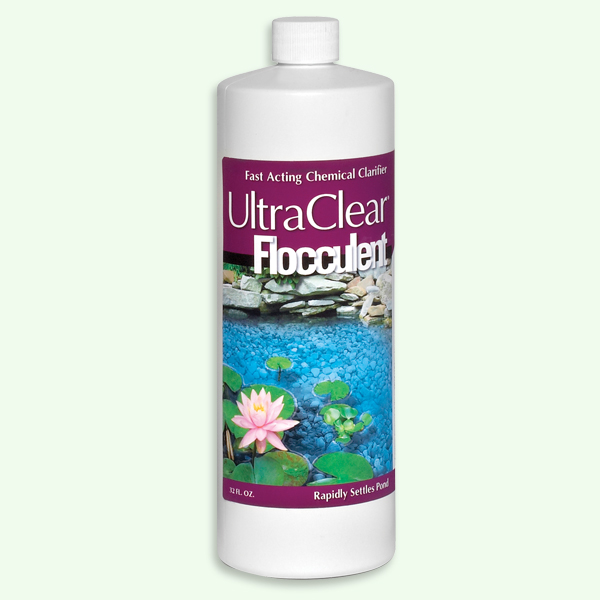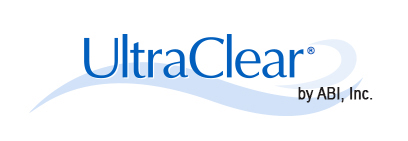
A chemical formulation for instant pond clarification.
UltraClear Flocculant is a chemical formulation that clears pond water by causing tiny particles to clump together (flocculation). Through flocculation, pond particles become large enough to settle by gravity to the bottom of the pond (where they can be vacuumed away) or easily filtered. Flocculant also removes phosphates from pond water. UltraClear Flocculant works in just hours, compared to UltraClear Biological Pond Clarifier, which will take days to weeks to show a satisfactory result. However, any chemical clarifier, including UltraClear Flocculant, will remove beneficial bacteria along with other pond particles. Therefore, we recommend application of UltraClear Biological Pond Clarifier after use of any chemical clarifier.
How Does UltraClear Flocculant Work?
Poor clarity results from suspended and colloidal materials in the pond water. Examples of suspended material are fine clay or silt particles that do not settle, free-swimming algae or other microorganisms, and tiny bits of decaying organic matter. These materials are so small that they remain suspended and do not settle to the bottom. Colloidal materials are smaller yet, and stay in suspension.
Flocculant is a polymer product with the ability to clump small particles together. When these materials are clumped together by the action of Flocculant, they become larger and heavier. If you add enough of the product, the large particles will actually sink to the bottom of the pond where they can be vacuumed away. Or, with lesser product doses, the clumping is less than with a heavier dose, but still enough to allow effective removal through filtration.
When the product is applied, the resulting clumps of previously suspended or colloidal material can be vacuumed from the bottom of the pond or filtered away. Either way, the result is healthy, clear pond water within 24 hours.
What is the Best Way to Apply Flocculant?
There are two things to take into account when dosing UltraClear Flocculant. The first is how much to use, and the second is when and how to apply the product.
Determining how much to dose is very simple. Use 2 ounces of Flocculant for every 1,000 gallons of pond volume (or about 1 teaspoon for every 100 gallons of pond volume).
To understand the best time and method for dosing the product, please read the following discussion of dissolved oxygen (O2), carbon dioxide (CO2), and pH.
All ponds have some phytoplankton algae. These algae cause significant swings in O2, CO2, and pH. Algae produce oxygen during photosynthesis, which requires sunlight. Dissolved oxygen concentration reaches its highest levels in late afternoon. While O2 is present, the biological flora in the pond will consume CO2. Therefore, while O2 is highest in late afternoon, CO2 is lowest. At night, in contrast, the respirating organisms release CO2. This means that the CO2 concentration increases throughout the night, and peaks around sunrise. Finally, pH of the pond swings in a daily cycle based on the amount of sunlight. For a given pond, the pH is relatively low in the evening, and increases during the daylight hours.
While Flocculant will work regardless of the time of day it is applied, best results are obtained when the product is applied in early evening. Allow the product to work overnight. The next day, after at least 8 hours have elapsed since application, use a filter to remove large clumps that have formed, or a vacuum to remove clumps that have sunk to the pond bottom.
To work effectively, the product must be well distributed throughout the pond. You can dilute the product into a volume of pond water and spread it around the pond. Or you can add the product near a pump inlet or aerator that will help distribute it. As each pond is different, some individual judgment must be used. But mechanical agitation from a pump or aerator will not hurt the product in any way. Therefore, take advantage of any natural mixing available in the pond to make sure that it is mixed throughout the pond as best as possible.
As stated previously, depending on the size of the clumps that result from product use, filtering or vacuuming can be used to remove the clumps from the water. However, if the clumps have fallen to the bottom of the pond and the clarity is satisfactory, it is not absolutely necessary to vacuum away the settled clumps. However, the settled clumps are a source of future problems, as they will eventually degrade, cause anaerobic conditions, and a cause a return of poor water clarity. We recommend vacuuming the settled clumps from the pond bottom whenever it is practical after application of Flocculant.
What Are the Safety Issues to be Concerned With?
As long as the product is used as directed, it will not harm fish, plants, or wildlife. However, do not use in ponds with fish intended for human consumption. Do not use more than the recommended dose, or more often than the recommended frequency. As with all household chemicals, store securely away from children.
What Influence Does Flocculant Have on Desirable Bacteria
All chemical flocculants, including Flocculant, will cause clumping of desirable bacteria along with suspended solids, phosphates and colloids. Therefore, use of any flocculant will remove some beneficial bacteria from the pond. We recommend using UltraClear Biological Pond Clarifier as a follow up to application of any flocculant. Apply UltraClear immediately after filtering or vacuuming. Use the 'start-up' UltraClear dose after applying any flocculant, then revert to the maintenance dose to keep your pond beautiful, clear, and healthy.
Packaging for Retailers & Distributors
UltraClear Flocculant is available in:
| P/N | Bottle Size | Bottles/Case |
|---|---|---|
| 41225 | 12 ounce | 24 |
| 41230 | 32 ounce | 12 |
| 41235 | Gallon | 4 |

